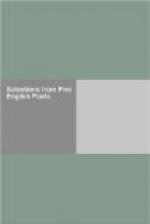In 1791 Coleridge entered Cambridge University. While there he was deeply stirred by events in France—for the Revolution was in progress—and ran some risk of being expelled by the open expression of his radical views on politics. His fine ode, France, written several years later, was the expression of this intense interest. During his second year of study, while suffering from a fit of despondency, he suddenly left the university—just why, no one knows—and went to London. There he enlisted in the 15th dragoons under the name of Silas Tompkyn Comberback. While he was in the service his awkwardness in doing manual labor, especially in grooming his horse, led to his exchanging tasks with his comrades: they performed his mechanical duties, while he wrote letters for them to their wives or sweethearts. A Latin inscription which he placed above his saddle in the stable led to the discovery of his true condition, and about the same time his friends learned of his whereabouts. At the end of four months in the dragoons he was bought out and enabled to return to his studies. He remained in Cambridge but a short time, however, leaving in 1794 without taking a degree.
The following year he married Miss Sara Fricker. This important step was taken on the strength of a small sum promised by a bookseller for a volume of poems which he was then writing. A month later his friend Robert Southey—afterwards well known as an author—married his wife’s sister. Some time before this, the two young men had conceived the idea of crossing the sea with a few congenial acquaintances and forming an ideal community on the bank of the Susquehanna. Fortunately the scheme was abandoned and the two dreamers turned their attention to literary projects.
Coleridge’s best work as a poet was done in 1797 and 1798, and probably the inspiration came largely from his friendship with William Wordsworth. During these two years the poets lived near each other in the beautiful Cumberland country, and while taking long rambles over the Quantock Hills they talked, planned, and wrote. The first result of this intercourse was a joint volume of poems called Lyrical Ballads, published in 1798. This included Coleridge’s Ancient Mariner and Wordsworth’s We are Seven. About the same time Coleridge wrote the first part of Christabel, the ode France, Kubla Khan, and a few other well-known poems. The impression which he made at this period of his life upon Dorothy Wordsworth, the poet’s sister, was recorded by her in a letter. She says of him: “He is a wonderful man. His conversation teems with soul and mind. . . . His eye is large and full, and not very dark but gray, such an eye as would receive from a heavy soul the dullest expression; but it speaks every emotion of his animated mind; it has more of the poet’s eye in a fine frenzy rolling than I ever witnessed. He has fine dark eyebrows and an overhanging forehead.”




